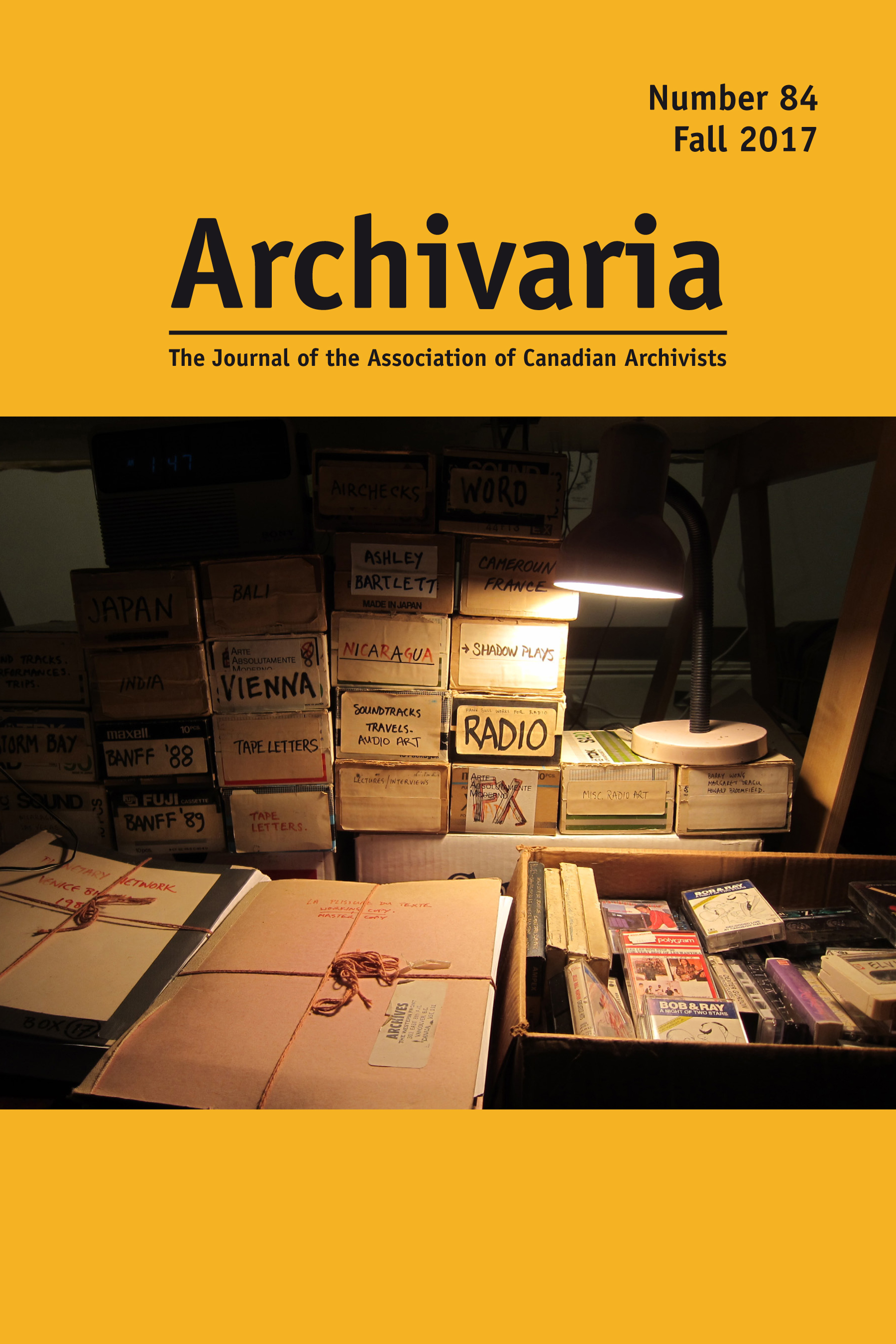Meaning-Making and Memory-Making in the Archives: Oral History Interviews with Archives Donors
Résumé
This article explores the processes, practices, and relationships that contribute to how meanings and memories are generated through archives. In the context of a pilot project to develop a methodology for integrating donor interviews into archival practice, I set out to identify existing or potential initiatives by drawing on archival theory, oral history, exchanges with archivists, and two audio-recorded interviews. The first interview – with Shirley Gyles, who donated the Negro Community Centre’s archives to Concordia University in Montreal – is important for its connection to Montreal’s Black community and Concordia’s Special Collections, where the above methodology is now being implemented. The second interview – with Susan Hart, an archivist who donated historian Peter Hart’s archives to the Memorial University of Newfoundland – is of interest for the interviewee’s different perspectives as a family member, archivist, and archives donor. Shifting the focus from static records to archivist-donor (and, eventually, end-user) relations, this study highlights archivists’ mediating roles as well as certain tensions – between evidence versus memory and between theory versus practice. It is argued that oral history interviews with archives donors can serve dual purposes: to provide valuable contextual information in a way that respects and enriches the concept of provenance and archival description while, at the same time, shedding light on the relationship between the donor and the institution and on archival practice itself, thus fostering support and dialogue between mainstream archives and communities, and encouraging self-reflexive, innovative, and participatory practices.
RÉSUMÉ
Cet article explore les processus, les pratiques et les liens qui contribuent aux façons dont les significations et les souvenirs sont générés par les archives. Dans le contexte d’un projet-pilote pour développer une méthodologie afin d’intégrer les entrevues avec les donateurs dans la pratique archivistique, je me suis mise à la recherche d’initiatives existantes ou potentielles en me servant de la théorie archivistique, de l’histoire orale, des échanges avec des archivistes et de deux entrevues sous forme d’enregistrement sonore. La première entrevue – avec Shirley Gyles, qui a fait don des archives du Negro Community Centre à l’université Concordia à Montréal – est importante pour ses liens avec la communauté noire de Montréal, ainsi qu’avec les collections spéciales de Concordia, où la méthodologie citée ci-haut est présentement mise en application. La deuxième entrevue – avec Susan Hart, une archiviste qui a fait don des archives de l’historien Peter Hart à l’université Memorial de Terre-Neuve – est intéressante pour les différentes perspectives du sujet de l’entrevue en tant que membre de la famille, archiviste et donatrice. En déplaçant le centre d’attention des documents statiques aux rapports entre archiviste et donateur (et éventuellement avec l'utilisateur), cette étude met en évidence le rôle médiateur des archivistes, aussi bien que certaines tensions – entre la preuve et la mémoire, et entre la théorie et la pratique. J’affirme que les entrevues d’histoire orale avec les donateurs des archives joueraient un double rôle : fournir de l’information contextuelle de grande valeur d’une façon qui respecte et enrichit le concept de provenance et de description archivistique, tout en éclairant la relation entre le donateur et l’institution ou la pratique archivistique elle-même, permettant ainsi le soutien et le dialogue entre les grands centres d’archives et les communautés, et encourageant des pratiques introspectives, innovantes et participatives.
Authors of manuscripts accepted for publication retain copyright in their work. They are required to sign the Agreement on Authors' Rights and Responsibilities that permits Archivaria to publish and disseminate the work in print and electronically. In the same agreement, authors are required to confirm that "the material submitted for publication in Archivaria, both in its paper and electronic versions, including reproductions of other works (e.g. photographs, maps, etc.) does not infringe upon any existing copyright." Authors of manuscripts accepted for publication retain copyright in their work and are able to publish their articles in institutional repositories or elsewhere as long as the piece is posted after its original appearance on archivaria.ca. Any reproduction within one year following the date of this agreement requires the permission of the General Editor.





